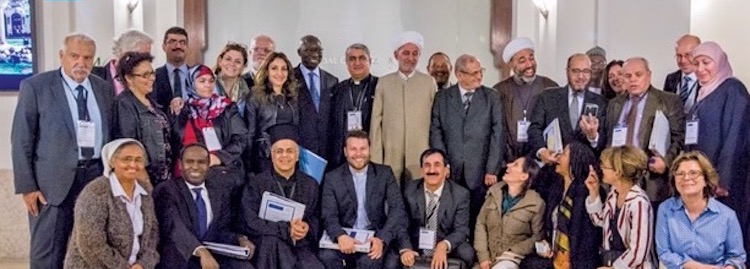By Jaya Ramachandran
VIENNA (IDN) – The United Nations has taken an important step towards preventing incitement to violence that could lead to atrocity crimes. More than 150 religious leaders from around the world, member states and UN officials, gathered in Vienna to discuss the implementation of the Plan of Action launched by Secretary-General António Guterres in July 2017 at a meeting of the world body’s Headquarters in New York.
Guterres said: “All religions teach respect for life and recognize human beings as fundamentally equal. These principles summon us to show respect for all human beings, even those with whom we might profoundly disagree or whose cultures might seem alien.”
He urged “the widest possible dissemination and implementation of this Plan of Action” so as to help save lives, reduce suffering and “realize our shared vision of peaceful, inclusive and just societies in which diversity is valued and the rights of all individuals are protected.”
Implementation of the Plan of Action will contribute to the prevention of atrocity crimes, especially in areas affected by religious and sectarian tensions and violence and enhance the respect, protection and promotion of human rights, including the rights to freedom of opinion and expression, freedom of religion or belief and peaceful assembly.
The plan was crafted after two years of intensive consultations at the global and regional levels to counter an alarming spike in recent years in hate speech and incitement to violence against individuals or communities, based on their identity.
It is the outcome of a process which began in 2015, in Fez, a city in northern inland Morocco, when the first consultation with religious leaders was held on their role in preventing incitement to violence.
232 religious leaders and others from 77 countries took part in the consultations. Participants included Buddhists, Christians, Muslims, Hindus, Jews and Sikhs from different groups and denominations, as well as representatives from various religious minorities, including Baha’i, Kakai, Yazidi, and Candomblé, as well as humanists. At least 30 percent of participants in all meetings were women.
The United Nations Office on Genocide Prevention and the Responsibility to Protect organized the consultations with the support of KAICID, the Vienna-based International Dialogue Centre, the World Council of Churches (WCC), and the Network for Religious and Traditional Peacemakers.
The meeting on the implementation of the Plan of Action for Religious Leaders and Actors to Prevent Incitement to Violence that Could Lead to Atrocity Crimes (the Plan of Action) took place in the Vienna International Center, United Nations Office in Vienna, from February 13-15, 2018.
In his remarks, Under Secretary-General Adama Dieng, Special Adviser on the Prevention of Genocide, stated: “The Plan of Action is a pioneering document. It is the first to engage with religious leaders and actors to develop context-specific strategies to prevent incitement that could lead to atrocity crimes. I believe its implementation could contribute not only to the prevention of atrocity crimes but also to other key agendas of the United Nations that seek to build peaceful, just and inclusive societies, prevent violent extremism and promote the inclusion of women and youth.”
The meeting focused on concrete measures to implement the Plan of Action at the national and local levels. According to the United Nations Information Service Vienna (UNIS), there was widespread agreement among participants that engaging youth and women must be a key focus if we are to prevent violence and promote peaceful, just and inclusive societies everywhere.
Many of the participants made commitments to implement the Plan of Action through a variety of means, individually and working in partnership, building on existing initiatives and networks, said UNIS. These commitments, based on discussions along both thematic and regional lines, will be included in the outcome document.
Some of the main points agreed on during the meeting were the need to map existing initiatives that could contribute to implementing the Plan of Action, collaborate on the development of a Covenant for faith actors for the realization of the Plan of Action, develop capacity-building activities for religious leaders and actors, disseminate and share curricula for interreligious coexistence, and include youth and women in all activities.
The meeting also resulted in the development of the terms of reference of a Steering Committee that will be responsible for overseeing the implementation process.
Commenting on the Fez Process, Faisal Bin Abdulrahman Bin Muaammar, Secretary-General of KAICIID, said: “If we are to seek positive and sustainable change, I think we need to deal with individuals, leaders and religious institutions to support policymakers in this area, and religious institutions should contribute to the implementation of results on the ground in their local communities.”
Antti Pentikäinen, the Executive Director and Convener of the Network for Religious and Traditional Peacemakers, said: “Religion is being increasingly pulled into conflicts to fuel division and violence. No religion will survive healthy if their leaders don’t resist and act against the incitement to hatred. It is not only humanity that is at stake. This is a question of the legacy of faiths.”
The Director of the Commission of the Churches on International Affairs of the World Council of Churches, Peter Prove, added: “There is certainly no room for complacency in a context in which the extremist ideologies that gave rise to extremist groups continue to be promoted.” [IDN-InDepthNews – 16 February 2018]
Photo: Regional meeting of religious leaders, Treviso, Italy. Credit: UN Office on Genocide Prevention and the Responsibility to Protect.
IDN is flagship agency of the International Press Syndicate.
facebook.com/IDN.GoingDeeper – twitter.com/InDepthNews

